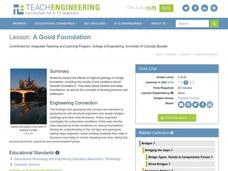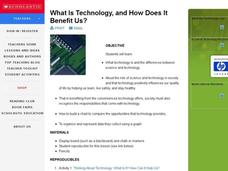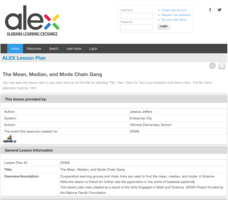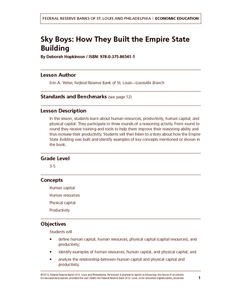Teach Engineering
Can You Resist This?
Some things are hard to resist. Small collaborative groups build circuits and calculate the voltage using Ohm's Law. Budding engineers explore the connection between the voltage across different resistors and linear functions with...
Baylor College
Food for Kids
Immediately capture the attention of your class with the smell of freshly popped popcorn in the sixth lesson of this series on the needs of living things. Young scientists first use their senses to make and record observations of...
NOAA
Sustaining Our Ocean Resources
Lead young scientists on an investigation of fishery practices with the final installment of this four-part unit. Using a PowerPoint presentation and hands-on simulation, this activity engages children in learning how fish populations...
Teach Engineering
A Good Foundation
It takes a strong foundation to build a house and a stronger one for a bridge. This resource presents the effects of geology and soil on bridge foundations. Working in groups, the class investigates the interaction of shallow and deep...
Space Awareness
History of the Universe
Your pupils may believe that you and their parents are the oldest things in the universe, but surprise! There are elements of the universe that are even older. Elementary scientists create a class timeline to demonstrate the expansive...
Cornell University
Scaling Down: Effects of Size on Behavior
Two activities explore the concept of size, especially small sizes down to the nano. Scholars practice determining volume, mass, and density and calculate exponential increases and decreases. They then predict and test the effect of size...
Curated OER
What Is Technology, and How Does It Benefit Us?
Students examine and define what technology is as well as the differences between science and technology. They assess the role of science and technology in society, conveniences technology offers and create a chart to compare the...
Alabama Learning Exchange
No More Money Trouble
Young consumers explore money identification and counting. In this cross-curricular money instructional activity, they participate in comprehension and writing activities prior to and after reading the book Money Trouble by Bill Cosby....
Alabama Learning Exchange
The Mean, Median, and Mode Chain Gang
Students analyze a set of data. They work in cooperative groups and use chain links to identify the mean, median, and mode of the chain.
Alabama Learning Exchange
Pennies, Pennies and More Pennies
Learners determine the number of pennies needed to fill a room. In this pennies lesson plan, students work in groups to determine the number of pennies needed to fill a room. They compute the probability of the head of a pin landing on...
Alabama Learning Exchange
Writing Equations for Parallel Lines
Acquaint your class with the concept of parallel lines. Learners watch a PowerPoint presentation about how to write equations of parallel lines. Their understanding of linear equations and slope is taken a step further by the exercises...
Alabama Learning Exchange
Investigating School Safety and Slope
Learners investigate the slope of various stairways through a "news report" approach and employ mathematical knowledge of applied slope to report on wheelchair accessibility and adherence to Americans with Disabilities Act. They...
Curated OER
The Earth Apple
Here is a thought-provoking lesson that has learners look at how much land can be used to grow food on our planet, along with the fact that our population is ever-increasing. Through the use of math and class discussion, learners get in...
Curated OER
Get a Leg Up
Traveling through space is an amazing experience, but it definitely takes a toll on the body. After reading an article and watching a brief video, learners perform an experiment that simulates the effects of zero gravity on the human body.
Curated OER
Food for Spaceflight
When astronauts get hungry in outer space, they can't just call and have a pizza delivered. In order to gain an appreciation for the challenges associated with space travel, young learners are given the task of selecting, testing, and...
Curated OER
Making Regolith
You may not be able to take a field trip to the moon, but that doesn't mean your class can't study moon rocks. Using graham crackers as the moon's bedrock and powdered donuts as micrometeorites, young scientists simulate the creation of...
Institute of Electrical and Electronics Engineers
Exploring at the Nanoscale
Nano-nano! Nanotechnology can seem like it's from another planet! After learning about this tiny technology, collaborative groups experiment with how smaller particles affect chemical reactions. They do this by immersing a whole and a...
University of Wisconsin
Measuring Slope for Rain Gardens
The slope of the land is an important feature when considering the erosion that will occur. In this resource, which is part of a rain garden unit, learners calculate the slope of the proposed garden site. Even if you are not planning a...
Berkshire Museum
Where’s the Water?: Acting Out Science Cycles
Young scientists transform themselves into rivers, oceans, clouds, and drops of water in order to explore the water cycle. After assigning and explaining to students their different roles in the activity, the teacher reads aloud a...
Mary Pope Osborne, Classroom Adventures Program
Mummies in the Morning Egyptian pyramids, hieroglyphics
Visit the Magic Treehouse and take your class on a trip through time with a reading of the children's book Mummies in the Morning. Using the story to spark an investigation into Egyptian culture, this literature unit engages...
Federal Reserve Bank
Sky Boys: How They Built the Empire State Building
How tall is the Empire State Building? Lead your class through a collaborative estimation activity to determine the number of quarters it would take to reach the top and teach the following concepts: human capital, human resources,...
Habits of Mind
Haileybury Habits of Mind Learning Resource Book
Imagine a learning community committed to using Costa and Kallick's Habits of Mind as the basis of curriculum design. The resource book is packed with lessons that are designed for and identify the standards and habits of mind targeted...
NOAA
Methane Hydrates – What's the Big Deal?
Have you ever tried to light ice on fire? With methane hydrate, you can do exactly that. The ice forms with methane inside so it looks like ice, but is able to burn. The lesson uses group research and a hands-on activity to help scholars...
National Wildlife Federation
Get Your Techno On
Desert regions are hotter for multiple reasons; the lack of vegetation causes the sun's heat to go straight into the surface and the lack of moisture means none of the heat is being transferred into evaporation. This concept, and other...
Other popular searches
- Math Lessons
- Halloween Math
- Thanksgiving Math
- Applied Math
- Christmas Math
- Math Puzzles
- Consumer Math
- Mathematicians
- Thanksgiving Math Worksheets
- Math Functions
- Mathematics
- Math Measurement























